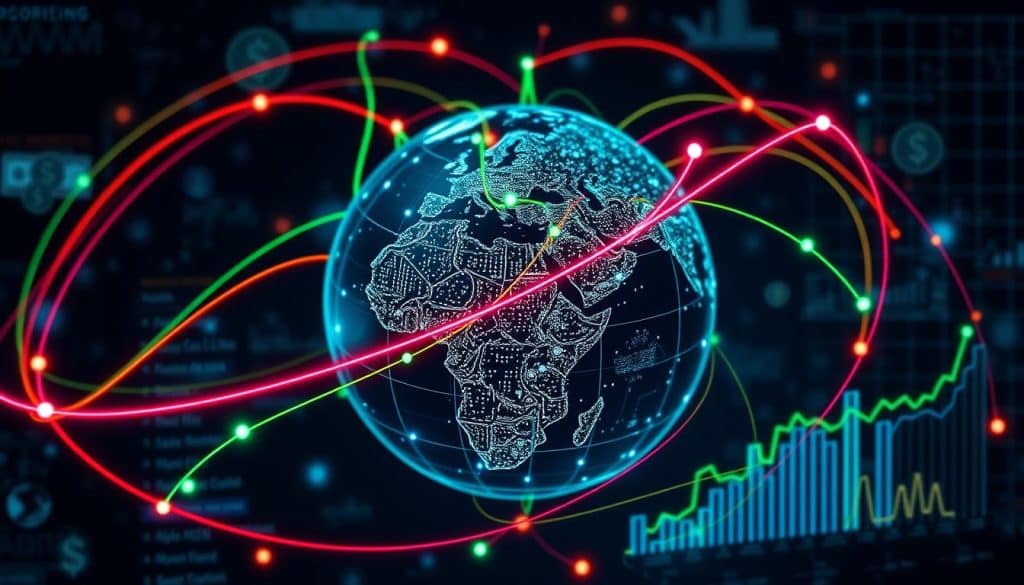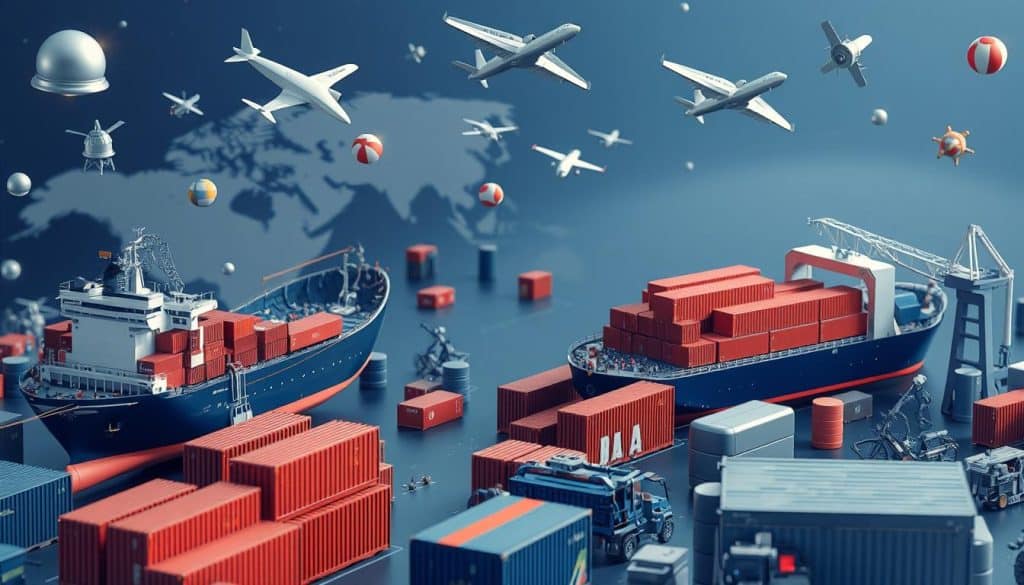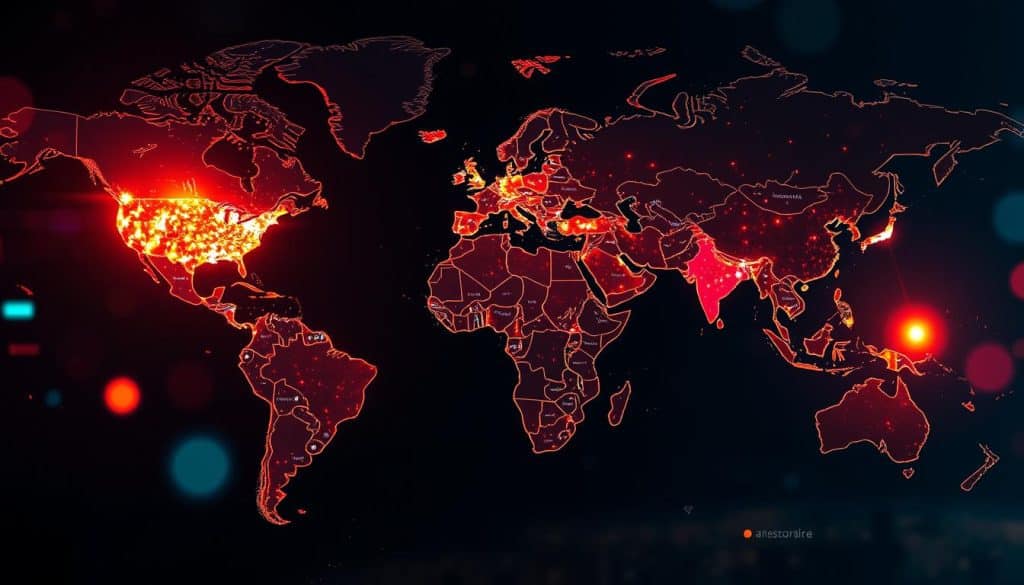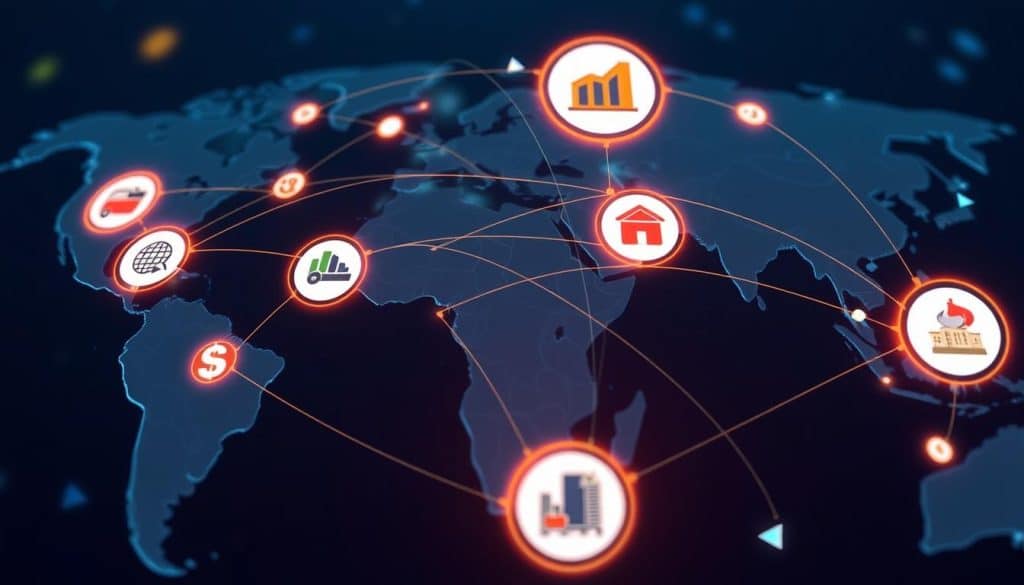Global trade is about swapping goods, services, and money across the world. It pushes economic growth and knits markets together closely. Thanks to globalisation, doing business across borders is essential. It helps the global economy to merge into one. Managing corporate tasks in foreign lands is complex, involving moving goods internationally, managing supply chains, sticking to rules, and entering new markets strategically.
Key Takeaways
- Global trade is essential for fuelling economic growth and creating interconnected markets.
- Cross-border business activities play a vital role in global economic integration.
- Effective corporate operations abroad involve international logistics and supply chain management.
- Regulatory compliance is a critical component of successful cross-border operations.
- Strategic market entry is necessary for expanding corporate presence internationally.
Introduction to Global Trade
Global trade is vital for economic growth and connecting countries. It allows access to wider markets and promotes innovation. Through it, countries can share resources more evenly.
Definition and Importance
Global trade moves goods and services across borders. It opens the door to international markets. Trade liberalisation reduces barriers, creating competitive markets. The World Trade Organization (WTO) helps keep trade fair, aiding the world economy.
Historical Overview
Global trade began with the Silk Road and colonial routes. These early trades evolved with better navigation and technology. Over time, these changes have crafted the global trade network we see today.
Modern Global Trade Systems
Current global trade is governed by treaties and groups like the WTO. They help ensure trade is fair and clear. The WTO plays a crucial role in liberalising trade, lowering barriers, and solving disputes. This supports worldwide commerce.
The Role of Corporations in Global Trade
Today, giants of the business world have a major role in global trade. They use their massive resources and smart strategies to enter new markets. This has a big impact on economies around the world. Let’s look at how businesses grow and their effects on local markets.
Corporate Expansion Strategies
Big companies have several ways to grow worldwide. These methods include:
- Joint Ventures: Working with local firms to gain market insight and share risks.
- Franchising: Letting local business people use the company’s brand and way of working.
- Subsidiaries: Creating fully owned branches for direct control in foreign places.
These approaches help firms enter new markets, earn more, and spread risks across different areas.
Impact on Local Economies
When big companies invest in a place, it can have various effects on the local economy:
- Job Creation: Setting up new businesses creates jobs and boosts the local economy.
- Infrastructure Development: Their investments can lead to better infrastructure, making places more connected and efficient.
- Technological Transfer: Bringing in new technology can make local industries more innovative and productive.
However, these big companies can be tough competition for smaller local businesses. This might affect the growth of these businesses and the local economy’s independence. Still, the benefits like investment and new technology are significant for economic growth.
Key Cross-border Corporate Operations
Companies grow by entering new countries. This needs good management of various operations. These include managing delivery systems, creating adaptable marketing plans, and following different laws. We’ll look into important parts of cross-border operations, focusing on seamless work and following rules.
Logistics and Supply Chain Management
Handling global supply chains well is key for timely goods delivery, cutting costs, and keeping up quality. Firms like Amazon and DHL are leaders in precise supply chain management. Good logistics, involving better routes and tracking in real time, are crucial for staying competitive globally.
International Marketing Strategies
Entering new markets requires adjusting marketing to fit different cultures and tastes. This approach is important for brands such as Coca-Cola and Unilever. They make campaigns that connect with local people without losing their global identity. Knowing cultural details and what consumers want helps make marketing that engages people and boosts sales.
Legal and Regulatory Compliance
Following laws and rules in other countries is crucial for international businesses. Sticking to legal standards, like trade laws and tax rules, makes sure things run smoothly and avoids fines. Companies like Microsoft and Siemens spend a lot to understand and follow local laws. This protects their reputation and meets legal requirements.
Cross-border Mergers and Acquisitions
For companies going global, getting cross-border mergers and acquisitions right is key. It all starts with deep research to grasp the market they’re entering. This helps spot any problems early, making planning and decision-making smarter. Plus, blending two companies smoothly needs a strong plan to bring operations together and hit synergy targets.
Strategies for Success
To make cross-border M&A work well, several strategies are crucial:
- Thorough Due Diligence: Deep checks into financials, legal standing, and how well the companies match culturally are vital.
- Understanding Market Nuances: Knowing local rules, what consumers want, and the competition is key.
- Effective Integration Plans: A solid plan for merging operations, people, and cultures is needed for success.
Notable Case Studies
Looking at big cross-border M&A stories gives us great lessons:
| Case | Description |
|---|---|
| ARM Acquisition by SoftBank | In 2016, Japan’s SoftBank bought British tech firm ARM for £24.3 billion. This move showed the value of expanding globally through smart technology and innovation. |
| GlaxoSmithKline & Pfizer Merger | The 2019 merger between GlaxoSmithKline and Pfizer’s consumer health sections aimed to create a worldwide leader in consumer healthcare. This underlined the importance of working together to make the most of shared resources and reach. |
These cases highlight how crucial good planning and research are in cross-border M&A success. They show the power of working together to grow globally.
Technological Innovations in Cross-border Trade
In today’s rapidly changing world, technology is key for improving cross-border trade. Digital tools and better communication methods help businesses work more efficiently across the globe. This makes operations transparent and quick.
Impact of Digitalisation
Digitalisation has changed cross-border trade a lot. E-commerce and blockchain have made trading clearer and cheaper. Particularly, blockchain leads by making transactions secure, clear, and permanent. This helps in reducing errors and fraud.
Advancements in Communication
Also, better digital communication has changed how global businesses talk to each other. Using the internet, email, and video calls, people can talk instantly across the world. This makes teamwork and making decisions faster and easier, which boosts global trade efficiency and productivity.
- Increased transparency through blockchain technology
- Reduced transaction costs
- Real-time communication through digital communication platforms
- Enhanced coordination and decision-making
| Technological Aspect | Benefits |
|---|---|
| Blockchain Technology | Increased Transparency, Reduced Fraud |
| Digital Communication Platforms | Real-time Communication, Improved Coordination |
| e-Commerce | Streamlined Transactions, Global Reach |
Economic Impacts of Global Corporate Operations

Global corporations play a big role in the world economy. They drive economic growth by creating jobs, making things more efficient, and bringing in investment from other countries. This makes countries connected, offering both chances and risks.
One key advantage is how they help the world economy grow. Big companies like Apple and Amazon move into new areas. They bring in new technology and many different kinds of jobs. These jobs help local economies grow, increasing how much money people have and laying the groundwork for long-term progress.
International investments are also important. Companies invest in places where doing business is easier. They bring money that helps build infrastructure. This helps the company right away but also makes the country’s economy stronger over time.
The table below highlights the impact of global corporate operations on various aspects of the economy:
| Aspect | Positive Impact | Negative Impact |
|---|---|---|
| Job Creation | Increased employment opportunities, diversified skill sets | Potential for job displacement in traditional industries |
| International Investment | Enhanced infrastructure, improved local economies | Economic dependency, potential political influence |
| Global Economic Growth | Increased productivity, technological advancements | Increased vulnerability to global economic fluctuations |
Multinational corporations often bring technological innovations. This makes processes better and gives these firms an edge. But, it also makes economies more vulnerable to worldwide economic changes. This means they need strong plans to manage risks.
In summary, global companies are key in making jobs and attracting foreign investments. Yet, the economic risks they bring show why it’s important to have careful and smart plans. This helps enjoy the benefits while reducing any possible downsides.
Challenges in Cross-border Operations
Navigating cross-border operations involves overcoming many hurdles. These can affect the efficiency and profitability of global companies. A deep understanding of laws and currency changes is needed.
Regulatory Differences
Companies face different rules in each country. Keeping up with these rules is vital to avoid legal problems and operation issues. They must understand complex laws and create strong compliance plans.
To avoid disruptions, companies need to stay alert to regulatory changes. They must quickly adjust their operations to keep running smoothly.
Currency Exchange Risks
The foreign exchange market can greatly change a company’s profits. Exchange rates that go up and down can cause unexpected losses. Companies need smart financial plans to handle these risks.
Watching currency trends and using strong risk tools are essential. This helps companies protect their finances against market changes.
| Challenge | Description | Management Strategy |
|---|---|---|
| Regulatory Differences | Complex and varying international regulations that require detailed compliance measures. | Comprehensive legal strategies and continuous monitoring of regulatory changes. |
| Currency Exchange Risks | Volatility in currency exchange rates impacting profitability. | Utilising financial risk management tools like hedging to mitigate losses. |
Regional Trade Agreements and Their Influence
Trade agreements are key in shaping global trade. They lower trade barriers and help countries’ economies to connect. We will look at how the European Union and the Asia-Pacific Economic Cooperation do this.
European Union (EU) Trade Policies
The EU’s trade policies show the power of regional cooperation. At its heart is the single market principle. This allows free movement of people, goods, services, and capital.
This integration offers a great business setting. It makes entering and operating across borders easier. The EU market is large and free from many trade hurdles.
- Enhanced trade efficiency and reduced costs
- Standardisation of regulations
- Increased market access for businesses
- Facilitation of free trade agreements with other global regions
Asia-Pacific Economic Cooperation (APEC)
APEC is key in regional trade. Its goal is to link its 21 member economies tighter. APEC works to make trade easier by simplifying customs and aligning standards.
APEC focuses on trade that helps everyone. It works towards:
- Reducing tariff and non-tariff barriers
- Improving supply chain connectivity
- Providing a platform for dialogue and collaboration
Both the EU and APEC highlight how trade deals and cooperation can boost growth and make trade smoother.
| Aspect | EU | APEC |
|---|---|---|
| Key Initiative | EU single market | APEC trade facilitation |
| Main Benefit | Free movement of goods, services, people, and capital | Reduction in trade and regulatory barriers |
| Member Economies | 27 EU countries | 21 Pacific Rim economies |
Knowing about regional trade agreements is vital for businesses wanting to grow globally. The EU and APEC show how good policies support international trade.
Cross-border Operations by these corporations are critical for global trade

In the world of global business, cross-border operations are essential. They help keep the world’s supply chains moving. These operations allow products and services to cross borders without problems. It’s vital for keeping goods flowing and economies growing.
The efficiency of these operations connects countries economically. They build strong bonds between different economies. This encourages working together and shared success. Logistics, following rules, and understanding cultures are all crucial. They make these operations vital for today’s business world.
Cross-border work also leads to cultural connections and partnerships. Companies understand and join different markets together. They create plans that work locally and globally. This approach grows their market and strengthens world economy links.
Corporations manage global networks strategically, making countries depend on each other economically. They plan and act carefully, making international business smoother. These efforts show their importance in world trade. Their work keeps the global economy growing and stable.
The Importance of Cultural Understanding
The global business world today highlights how crucial cultural understanding is. For good international business talks and a productive workforce with people from different cultures, being able to communicate well across cultures is key. We will look at important parts of being culturally aware, focusing on how we talk during negotiations and how workplaces function.
Negotiation Practices
Knowing about different cultures is vital in international business talks. Each culture has its own way of negotiating, impacting deal success. While some cultures prefer straight talking, others might use hints. Adapting to these styles can make a big difference in negotiations.
To talk well with people from other cultures, knowing the language is not enough. It’s also about understanding body language, the situation, and small cultural hints. For example, what a strong handshake means can vary between cultures. Being aware of these small things can immensely help in negotiations.
Workplace Dynamics
Managing a team from various cultures means having rules that accept and celebrate these differences. A workplace that gets along well not only makes employees happier but also does better work. Companies like HSBC and Unilever know that a place where everyone’s background is appreciated can bring new ideas and solutions.
To create such a team, it’s about setting up rules that promote understanding and sharing between cultures. This can include training on diversity, group activities, and setting up a way for everyone to share their cultural views. These steps can help close any cultural divides and make the work environment united.
| Aspect | Western Business Culture | Eastern Business Culture |
|---|---|---|
| Communication Style | Direct and Explicit | Indirect and Contextual |
| Decision Making | Individualistic | Collectivistic |
| Time Orientation | Monochronic (Strict Time) | Polychronic (Flexible Time) |
| Formality | Informal and Casual | Formal and Respectful |
Learning about and using these cultural traits can make communication better and business talks smoother. Promoting an understanding of different cultures in international teams leads to a workforce that’s both inventive and united.
Risk Management in Global Trade
Managing risks is crucial for businesses in worldwide trade. It demands looking at risks from all angles. This makes sure companies work smoothly across different countries.
Identifying Potential Risks
Companies need to look ahead for potential trade risks. This means checking for political unrest, economic changes, and problems in the supply chain. By understanding these risks early, businesses can stay in line with global trade rules.
Mitigating Financial Risks
Businesses must tackle financial risks with strong strategies. Spreading out investments helps lessen the impact of market ups and downs. Using tools like futures and options protects against currency changes. This keeps the company’s money safe during global market shifts.
With careful planning and strategy, businesses can deal with global trade rules. This keeps them strong and steady in their international deals.
The Future of Cross-border Corporate Operations

Global trade is changing fast, leading to big shifts in cross-border business activities. Looking ahead, emerging economies and new technology will play key roles in changing how companies plan their strategies.
Emerging Markets
Emerging markets are now key to global trade. They offer big chances for firms ready to understand local needs and connect with new customers. Firms need to customize their efforts and really get involved locally to make the most of these opportunities. These markets come with their own challenges and chances for growth.
Countries like India, Brazil, and Nigeria are growing fast. Their role in global trade is getting bigger. By welcoming trade innovations in these areas, companies can invent new ways of doing business.
Technological Disruptions
New technologies are shaking up how businesses operate. Tools like AI, IoT, and self-driving vehicles are making old methods outdated. This means companies must be agile and forward-thinking.
Investing in these technologies can make companies more efficient, cut costs, and lead to innovative business types that can handle change well. For companies wanting to stay ahead, it’s vital to grasp and use these tech changes.
To show the effect, here’s how cutting-edge tech is changing business:
| Technology | Traditional Business Models | Futuristic Business Models |
|---|---|---|
| Artificial Intelligence | Manual Data Analysis | Automated Data Insights |
| Internet of Things (IoT) | Reactive Supply Chain | Proactive and Predictive Supply Chain |
| Autonomous Transport | Human-driven Logistics | Driverless Logistics and Delivery |
In the end, embracing the changes brought by new economies and technologies is crucial. It will shape the future of international business operations.
Case Studies of Successful Global Corporations
Apple’s global strategy includes a complex supply chain and a focus on technology. They choose suppliers carefully and use tech to make sure products are available everywhere. This approach makes Apple quicker and more responsive to market changes.
Amazon’s success shows how important it is to focus on customers and logistics. They adapt their services for different areas and use data to stay ahead. Amazon keeps innovating and growing its infrastructure to tackle the challenges of international business.
Key takeaways from these corporations include being adaptable, investing in tech, and focusing on customer happiness. Companies that want to succeed internationally can learn from Apple and Amazon. They show how to plan for growth and face global challenges.
















